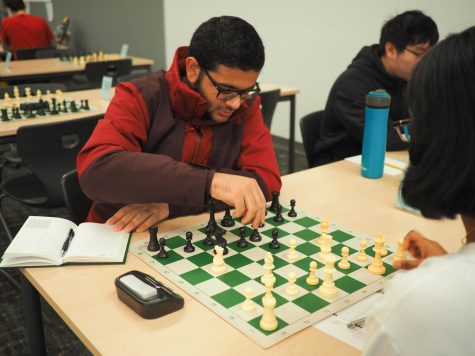I Lasted Three Years Without Chess Then Relapsed

As I walk through the gates of Stanwood High School, I’m gearing up for my first in-person chess match in years. Even though I’m not playing for a prize, my nerves are still akin to what I felt in my prime chess years in fifth grade. At the top of four flights of stairs, the pairings are attached to the wall opposite the library in which the games take place. Making my way through the crowd, I look for what board I’ll play on, and more importantly, who my opponent will be. When I see that his rating is 900, I can tell that he, too, plays chess just for fun.
Ratings are the funniest part of chess. Everyone agrees that you should never look at them before playing a game — you’ll either get scared or underestimate your opponent. And yet everyone always seems fixated on studying them. They’re a prophecy: if you’re rated 300 points higher, the game should go boom, boom, boom, checkmate. If it’s a difference of 50 points, then the battle will be won with eyes dry from staring at the chessboard.
With a rating of 1361 (as an average sophomore who plays chess for fun), I anticipate an easy game: my opponent should blunder a piece in the opening, and I should gain a quick tactical advantage. But I’d overlooked one crucial fact: high school chess is a different game compared to middle school.
After a normal opening, we both take time to carefully plan out every move of the middle game. We trade pieces incessantly, but once he makes a blunder, I pounce on the opportunity. Whittling down whatever material he has left, I eventually checkmate him with. Whew; that was not an easy game, but I chalk it up to the inadequate sleep I got from working on the chemistry presentation. Tomorrow will be easier…
The first game on Saturday morning is quick but not easy. My 11th move involves giving up a piece to make my opponent’s king vulnerable to attack, and my heart can’t help but race. It’s one of those make-or-break moves — if I’ve messed it up, it’s over. As my hand comes off my piece, I realize that I had indeed calculated wrong. But my opponent doesn’t see the one move that could save her. She goes ahead and walks straight into my trap. Hallelujah!
After a mate in three moves, I go out toward the main room, where the Lakeside team is fighting its biggest competitor, Tesla STEM High School. I see Daniel W. ’25 finished early — he won in under an hour. After a short discussion about his opponent’s lackluster opening prep, we walk back in and watch the remaining four matches. To me, they appear all tied up, including, incredibly, the one Eric Z. ’24 is currently playing. His match against Anthony He, the 13th highest-rated high schooler in the country, is the highest-profile matchup of the tournament. According to Daniel, Eric’s losing, but only in a very technical way — his pawns are “not where they should be.” I go downstairs and soon see Eric walking down the stairs, annoyed; despite his expression, he drew a game everyone thought he would lose.
Next up is a fulfilling lunch at a local restaurant: McDonald’s. Three bags of fries later (thanks to the other reporters for picking such a vegetarian-friendly place), I begin my last game. It’s the most boring game I’ve ever played. Not only are the moves blander than a beige Ford, but my opponent takes forever to move. On move 20, I press the clock and walk over to the couches next to the window to relax. I accidentally fall asleep, but when I wake 25 minutes later, it’s still my opponent’s move.
After a short exchange of pieces, he starts stalling again, so I get up, watch other games, grab a sip of water, use the restroom, sit on the couches next to the window, do math homework, and close my eyes for five minutes. My opponent hasn’t moved in 30. I roll my eyes and take a seat. The next hour continues with protracted moves and little of anything happening.
Eventually we, the reporters, have to head out, so I force my opponent into a draw and go about the rest of my evening, ending my first chess competition in three years. Though it was a high school competition, it felt no different from those in fifth grade: 300 people crowded into one venue over a weekend, anxiously awaiting their pairings, moving pieces with shaky hands, calculating for hours.
Ever since his little incident in April 26, 1986, Rohan Dhillon has been on the run from a variety of governmental agencies and human rights organizations—...
